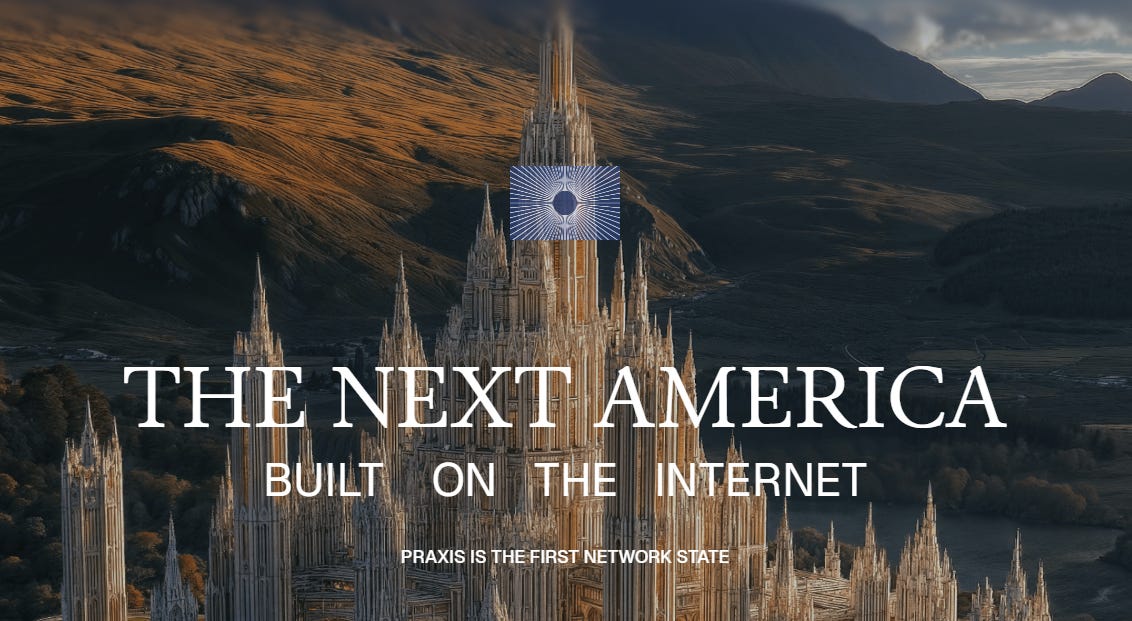⚡Top of the Agenda
Praxis Nation secures $525 million in funding to build the first network state
Bitcoin mining continues to centralize in the United States raising concerns over potential government intervention
LEADING STORIES
1. Praxis Nation secures $525 million in funding
The new funding announcement of $525 million for the Praxis Nation ‘Network State’ is one of the largest investments of its kind in this space.
A Network State as outlined by its inventor Balaji Srinivasan is “a highly aligned online community with a capacity for collective action that crowdfunds territory around the world and eventually gains diplomatic recognition from pre-existing states.” These communities are enabled by digital technologies like AI and Bitcoin and allow for efficient governance and free markets.
This investment is contingent on the investor GEM Digital being provided with cryptocurrency tokens that represent ownership in the future project.
The secured funding is for a new technology-first city called Praxis Nation and is meant to be used to purchase land, obtain permits, construct buildings, and getting people to move.
Their central vision for this city is one that allows innovation to flourish in fields like AI, cryptocurrency, biotech, energy, and advanced manufacturing. (By not having so many rules that say you cannot do things.)
However, Praxis’ overarching ambition is to foster a culture within its community which promotes Western values and ideas. As stated on their website. “Inspired by the wisdom of great civilizations, we believe that true sovereignty is achieved through alignment with the transcendent. The Praxian way of life is driven by a vital energy that seeks transcendence through heroic action and contemplation. Our mission is to channel this drive into a cohesive way of life, forged by social structures and institutions that guide our people toward their destiny.” We don’t know what this means either, but it sounds cool.
The project is led by 28-year-old co-founder Dryden Brown, who has survived various character assassinations from, for instance, the New York Times, setting public image back. His response: success.
Praxis has a host of impressive investors including, GEM Digital - providing $500 million -, Arch Lending, and notable angel investors like Dan Romero Tom Schmidt, Balaji Srinivasan, and apparently everyone important in this space:
The location for the city has yet to be determined, but as per the Praxis official website, they are in the last stages of deciding.
Praxis has stated that it has over 14,000 members and over 400B in collective market capitalisation for companies built by Praxians.
It is currently possible to gain Praxis Citizenship via their Steel Visa.
A new form of membership called Praxis Nomads has also been created for those who want to contribute, but who are not eligible for full citizenship (yet).
If you’re keen, you could attend the Praxis World Congress on November 7th, in the Dominican Republic
2. Bitcoin mining continues to centralize in the United States
US-listed, publicly traded, Bitcoin mining stocks now account for 28.9% of the network hashrate, according to J.P. Morgan, a record high.
The hashrate is the total amount of computing power in the network. If you have over 50% of the hashrate of the Bitcoin network, you can effectively decide what goes into the blockchain.
The combined hashrate of 14 tracked U.S.-listed miners has increased by ~70% year-to-date to 194 EH/s (exahashes per second) while the total network has only gained 33%, increasing the relative share of the US miners.
Why this concerns us:
While hashing power has historically been fairly decentralized, this puts a lot of Bitcoin hashing power under control of the US government, with no signs of slowing down.
At the Bitcoin Conference 2024 in Nashville, Matt Corallo, an OG Bitcoin developer, stated that “BTC mining has not in any meaningful sense of the word, actually been decentralized”. In his talk he warns of the increasing size of Bitcoin mining pools.
Mining pools allow Bitcoin miners to pool together to share the block rewards and fees (Bitcoin you receive for checking whether transactions are valid), of which there is a low chance of achieving if you are a smaller miner.
Two such pools, Pools Foundry and Antpool, already control 60% of the hashing rate.
Now both the size of these pools and the growing hashing power of Bitcoin miners in the USA are increasingly centralizing factors, opening up a vulnerability: the government may issue requests to censor certain transactions. They currently do not, and show no signs that they will, but it’s not a great idea to wait to see whether they will. It is said that these transactions could then be included in later blocks, as not all mining is located in the US, or in pools, but with 50%+ of the hashing power you could potentially fork off a new successful chain that does not include the censored transaction (address), ever.
To learn more about what can be done about miner centralization, watch Corallo’s talk, as well as the podcast shared below in the Media section.
Other stories
In the spirit of Praxis, some Heroic news from this week
Amazon, Google and Microsoft are increasingly turning to nuclear power for their energy needs, especially to fuel AI operations. These companies are striking deals with nuclear plant operators and developers, including agreements to revive shuttered plants and invest in new technologies.
Small modular reactors (SMRs) are gaining attention as a potentially cheaper and easier-to-build alternative to traditional large reactors. Tech industry backing could help reinvigorate the nuclear sector, which has struggled with cost overruns and delays in recent projects.
In biotech news….
Scientists from the Human Atlas Project discover how the body creates skin from stem cells and the research could lead to breakthroughs in slowing down aging. Researchers identified which genes are activated to form skin during fetal development and may allow inherited skin diseases to be cured.
The Human Cell Atlas project has analyzed 100 million cells from different body parts over eight years and their future goals include combining individual organ atlases to rewrite textbooks on human physiology and anatomy.
and…
Physicist and philosopher, and writer of our favorite boo “The Beginning of Infinity”, David Deutsch and Gad Saad are planning to release a podcast episode on the Saad Truth :
Interesting Media & Content
There are some solutions to Bitcoin mining centralization, discussed in this podcast episode hosted by Preston Pysh:
Upcoming Events
Ongoing: The Network School, Near Singapore: September 23 - December 23, 2024.
Zelar City, Berlin, Germany: October 5th - November 17th, 2024
Edge City Lanna, Chang Mai, Thailand: October 10th - November 10th, 2024.
The Network Society Camp, Austin, TX, United States: 11 - 14 October, 2024.
Crypto City Builders - Exploration Program, Próspera ZEDE, Roatán, Honduras: October 19th - November 25th, 2024.
Crypto Cities Summit, Próspera ZEDE, Roatán, Honduras: 26 - 27 October, 2024.
Liberty in Our Lifetime, Prague, Czech Republic: 1 - 3 November, 2024.
Arkham x Praxis Campus, Dominican Republic: 5 - 8 November, 2024.
Praxis World Congress, CAMPUS Pop-Up City, Punta Cana: November 7, 2024.
ZuGarden, Bangkok and an Island in Thailand: 10 - 30 November, 2024.
Adopting Bitcoin, San Salvador, El Salvador: 15 - 16 November, 2024.
Safe Harbor Summit, Vitalia City, Próspera ZEDE, Honduras: 16 - 17 November, 2024.
Vitalia Startup Demo Day, Vitalia City, Próspera ZEDE, Honduras: November 18th, 2024.
Vitalia Forever, Vitalia City, Prospera ZEDE, Honduras: January 6th - March 3rd, 2025.
Edge Esmeralda 2025, Healdsburg, CA, USA: April 24th - June 21st, 2025
See based.guide’s event page for all events.







